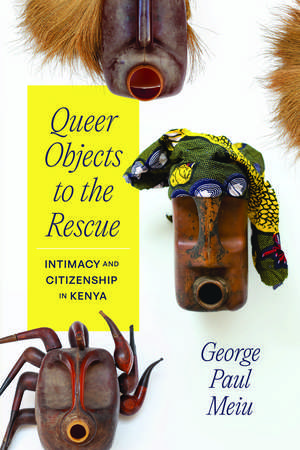Queer Objects to the Rescue: Intimacy and Citizenship in Kenya
Autor George Paul Meiuen Limba Engleză Paperback – 12 dec 2023
Campaigns calling on police and citizens to purge their countries of homosexuality have taken hold across the world. But the “homosexual threat” they claim to be addressing is not always easy to identify. To make that threat visible, leaders, media, and civil society groups have deployed certain objects as signifiers of queerness. In Kenya, for example, bead necklaces, plastics, and even diapers have come to represent the danger posed by homosexual behavior to an essentially “virile” construction of national masculinity.
In Queer Objects tothe Rescue, George Paul Meiu explores objects that have played an important and surprising role in both state-led and popular attempts to rid Kenya of various imagined threats to intimate life. Meiu shows that their use in the political imaginary has been crucial to representing the homosexual body as a societal threat and as a target of outrage, violence, and exclusion, while also crystallizing anxieties over wider political and economic instability. To effectively understand and critique homophobia, Meiu suggests, we must take these objects seriously and recognize them as potential sources for new forms of citizenship, intimacy, resistance, and belonging.
| Toate formatele și edițiile | Preț | Express |
|---|---|---|
| Paperback (1) | 169.14 lei 3-5 săpt. | +12.24 lei 4-10 zile |
| University of Chicago Press – 12 dec 2023 | 169.14 lei 3-5 săpt. | +12.24 lei 4-10 zile |
| Hardback (1) | 581.36 lei 6-8 săpt. | |
| University of Chicago Press – 4 dec 2023 | 581.36 lei 6-8 săpt. |
Preț: 169.14 lei
Nou
Puncte Express: 254
Preț estimativ în valută:
32.37€ • 33.60$ • 26.99£
32.37€ • 33.60$ • 26.99£
Carte disponibilă
Livrare economică 04-18 martie
Livrare express 15-21 februarie pentru 22.23 lei
Preluare comenzi: 021 569.72.76
Specificații
ISBN-13: 9780226830582
ISBN-10: 0226830586
Pagini: 240
Ilustrații: 17 halftones
Dimensiuni: 152 x 229 x 18 mm
Greutate: 0.32 kg
Ediția:1
Editura: University of Chicago Press
Colecția University of Chicago Press
ISBN-10: 0226830586
Pagini: 240
Ilustrații: 17 halftones
Dimensiuni: 152 x 229 x 18 mm
Greutate: 0.32 kg
Ediția:1
Editura: University of Chicago Press
Colecția University of Chicago Press
Notă biografică
George Paul Meiu is professor of anthropology at the University of Basel, Switzerland. He is the author of Ethno-erotic Economies, also published by the University of Chicago Press.
Cuprins
1 Queer Objects: Introduction
2 Intimate Rescue: Grammars, Logics, Subjects, Scenes
3 “Male-Power”: Virility, Vitality, and Phallic Rescue
4 Bead Necklaces: Encompassment and the Geometrics of Citizenship
5 Plastics: Moral Pollution and the Matter of Belonging
6 Diapers: Intimate Exposures and the Underlayers of Citizenship
7 The Homosexual Body: Gayism and the Ambiguous Objects of Terror
Conclusion
Acknowledgments
Notes
References
Index
2 Intimate Rescue: Grammars, Logics, Subjects, Scenes
3 “Male-Power”: Virility, Vitality, and Phallic Rescue
4 Bead Necklaces: Encompassment and the Geometrics of Citizenship
5 Plastics: Moral Pollution and the Matter of Belonging
6 Diapers: Intimate Exposures and the Underlayers of Citizenship
7 The Homosexual Body: Gayism and the Ambiguous Objects of Terror
Conclusion
Acknowledgments
Notes
References
Index
Recenzii
“Queer Objects to the Rescue is brilliantly written, and it provides us with a resilient scaffolding for theorizing queer valance in Africa.”
“This sophisticated critical study of queerness, objecthood, and subjecthood offers novel approaches and languages for scholarly engagement with identities situated in social, cultural, and economic politics, histories of inclusion and exclusion, and complex fabrications of (intimate) citizenships.”
“Filled with smart arguments and clean-edged prose, Queer Objects to the Rescue makes a signature contribution to the literature on non-normative sexualities in Africa. It maps out novel terrain for semiotic and new materialism theory, as well as for queer and African studies, and it richly unsettles simplistic accounts of homophobia and citizenship in Kenya today.”
